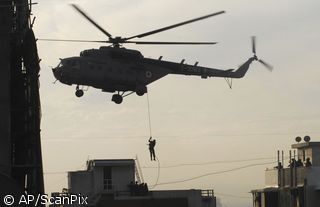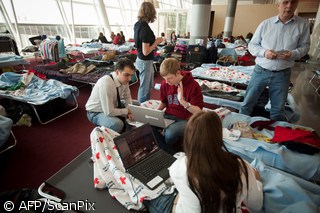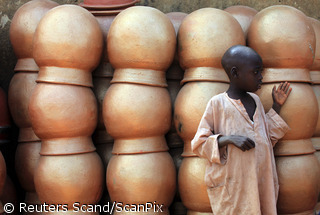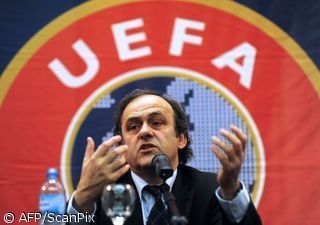Poland and Russia on Saturday mourned thousands of people massacred by the Soviet NKVD secret police during World War Two.
Published:
4 September 2000 y., Monday
Poland and Russia on Saturday mourned thousands of people massacred by the Soviet NKVD secret police during World War Two and vowed to strengthen the often strained relations between the two neighbors.
Polish Premier Jerzy Buzek and Russian Interior Minister Vladimir Rushailo dedicated a cemetery marking the mass grave of some 6,000 Poles shot in pine forests outside the Russian town of Mednoye, 200 km (125 miles) northwest of Moscow.
It is one of several mass graves in Russia and Ukraine that hold the bodies of some 22,000 well-educated Poles, including reserve officers, border guards, policemen and civil servants who the Soviets feared would oppose their control of Poland.
Soviet troops invaded Poland in September 1939 under a secret pact with Nazi Germany to divide Eastern Europe. The Germans broke the pact in 1941 when they invaded the Soviet Union and the territories it had occupied.
In 1943, German troops advancing eastward found the bodies of some 4,000 Polish army officers in a mass grave in Katyn and accused Soviet troops of killing them.
The Soviet Union maintained for decades that the Nazis had killed the men during their occupation of the area, admitting responsibility only in the final days of Mikhail Gorbachev's perestroika period. During World War Two, Poland's underground government also searched for officers who disappeared from prisoner of war camps near other towns, including Tver in Russia, from where prisoners were taken to the forest outside Mednoye. The bodies of about 7,000 Poles have never been found.
Šaltinis:
Central Europe Online
Copying, publishing, announcing any information from the News.lt portal without written permission of News.lt editorial office is prohibited.
The most popular articles
 This Saturday, 24 April, the Carlos de Amberes Foundation is hosting two conferences of European experts on the environment and sustainability and immigration policies in the EU, organised by the Allianz Cultural Foundation in the context of the Allianz Alumni Academy.
more »
This Saturday, 24 April, the Carlos de Amberes Foundation is hosting two conferences of European experts on the environment and sustainability and immigration policies in the EU, organised by the Allianz Cultural Foundation in the context of the Allianz Alumni Academy.
more »
 The Trident-Oberoi Hotel in Mumbai to reopen, following renovations after militant attacks in 2008
more »
The Trident-Oberoi Hotel in Mumbai to reopen, following renovations after militant attacks in 2008
more »
 Fresh from their wedding in Jamaica, British tourists Siobhan and David Monteith never thought for a minute that a volcano would interrupt their honeymoon.
more »
Fresh from their wedding in Jamaica, British tourists Siobhan and David Monteith never thought for a minute that a volcano would interrupt their honeymoon.
more »
 The streets of Manila filled with a colourful display on wheels, just days before the world celebrates Earth Day’s 40th anniversary.
more »
The streets of Manila filled with a colourful display on wheels, just days before the world celebrates Earth Day’s 40th anniversary.
more »
 Tens of thousands of Ugandans flocked to the hilltop palace of Africa’s youngest tribal ruler for two days of noisy parties marking a decade in power for the 18-year-old king.
more »
Tens of thousands of Ugandans flocked to the hilltop palace of Africa’s youngest tribal ruler for two days of noisy parties marking a decade in power for the 18-year-old king.
more »
 Colourful warriors leap across the stage at the 6th annual Songjiang Battle Array, in Neimen, southern Taiwan.
more »
Colourful warriors leap across the stage at the 6th annual Songjiang Battle Array, in Neimen, southern Taiwan.
more »
 Consumers benefit from greater use of European product safety alert system and more effective market surveillance.
more »
Consumers benefit from greater use of European product safety alert system and more effective market surveillance.
more »
 Representatives from all Member States are gathering for two days in Zaragoza from 15 to 16 April to discuss how migrant integration can become a driver for social cohesion in the EU.
more »
Representatives from all Member States are gathering for two days in Zaragoza from 15 to 16 April to discuss how migrant integration can become a driver for social cohesion in the EU.
more »
 The much heralded "citizens initiative" to change EU laws has been given a cautious welcome by MEPs. Under the scheme - a major innovation of the Lisbon treaty - a million people can back a plan to introduce European legislation.
more »
The much heralded "citizens initiative" to change EU laws has been given a cautious welcome by MEPs. Under the scheme - a major innovation of the Lisbon treaty - a million people can back a plan to introduce European legislation.
more »
 Football shares Europe's values of integration, solidarity and social inclusion, and can play a significant role in helping the EU to promote them, especially at the local level where clubs are part of their local communities.
more »
Football shares Europe's values of integration, solidarity and social inclusion, and can play a significant role in helping the EU to promote them, especially at the local level where clubs are part of their local communities.
more »